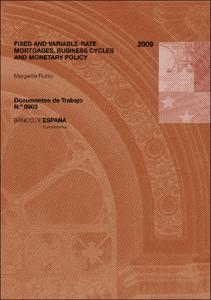Registro completo de metadatos
| Campo DC | Valor |
|---|---|
| dc.contributor.author | Rubio Sánchez, Margarita |
| dc.date.accessioned | 2019-08-10T17:54:54Z |
| dc.date.available | 2019-08-10T17:54:54Z |
| dc.date.issued | 2009-02-26 |
| dc.identifier.issn | ISSN: 0213-2710 (en papel) |
| dc.identifier.issn | ISSN: 1579-8666 (en línea) |
| dc.identifier.uri | https://repositorio.bde.es/handle/123456789/6940 |
| dc.description.abstract | The aim of this paper is twofold. First, I study how the proportion of fixed and variable-rate mortgages in an economy can affect the way shocks are propagated. Second, I analyze optimal implementable simple monetary policy rules and the welfare implications of this proportion. I develop and solve a New Keynesian dynamic stochastic general equilibrium model that features a housing market and a group of constrained individuals who need housing collateral to obtain loans. A given proportion of constrained households borrows at a variable rate, while the rest borrows at a fixed rate. The model predicts that in an economy with mostly variable-rate mortgages, an exogenous interest rate shock has larger effects on borrowers than in a fixed-rate economy. Aggregate effects are also larger for the variable-rate economy. For plausible parametrizations, differences are muted by wealth effects on labor supply and by the presence of savers. More persistent shocks, such as inflation target and technology shocks, cause larger aggregate differences. From a normative perspective I find that, in the presence of collateral constraints, the optimal Taylor rule is less aggressive against inflation than in the standard sticky-price model. Furthermore, for given monetary policy, a high proportion of fixed-rate mortgages is welfare enhancing |
| dc.format.extent | 51 p. : fórmulas |
| dc.language.iso | en |
| dc.publisher | Banco de España |
| dc.relation.ispartof | Documentos de Trabajo / Banco de España, 0903 |
| dc.rights | Reconocimiento-NoComercial-CompartirIgual 4.0 Internacional (CC BY-NC-SA 4.0) |
| dc.rights | In Copyright - Non Commercial Use Permitted |
| dc.rights.uri | https://creativecommons.org/licenses/by-nc-sa/4.0/deed.es_ES |
| dc.rights.uri | http://rightsstatements.org/vocab/InC-NC/1.0/ |
| dc.subject | Fixed/Variable-rate mortgages |
| dc.subject | Monetary policy |
| dc.subject | Housing market |
| dc.subject | Collateral constraint |
| dc.title | Fixed and variable-rate mortgages, business cycles and monetary policy |
| dc.type | Documento de trabajo |
| dc.identifier.bdebib | 000223188 |
| dc.identifier.bdepub | DTRA-200903-eng |
| dc.subject.bde | Fluctuaciones y ciclos económicos |
| dc.subject.bde | Política monetaria |
| dc.subject.bde | Instituciones financieras no bancarias |
| dc.publisher.bde | Madrid : Banco de España, 2009 |
| dc.subject.jel | E32 |
| dc.subject.jel | E44 |
| dc.subject.jel | E52 |












